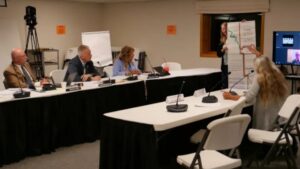SALT LAKE CITY — As the federal government shutdown drags into its fourth week, Utah lawmakers are exploring ways to prevent 85,000 households from losing access to food assistance when SNAP (Supplemental Nutrition Assistance Program) benefits expire on October 31.
Senate Minority Leader Luz Escamilla said the state could potentially step in with temporary funding to keep the program going — a move that would require legislative approval through a special session.
“Logistically speaking, we could deliver funds to the EBT cards if we utilize state money,” Escamilla explained. “There’s still research being done on how that would work, but it’s possible.”
A Potential State Intervention
SNAP, which provides food benefits to low-income families, is normally funded by the federal government. But with the shutdown freezing federal budgets, Utah and other states are facing the possibility of handling those costs on their own.
Escamilla noted that Utah could act quickly if leaders agree to convene a special legislative session.
“It will require legislative approval, meaning the entire Legislature,” she said. “But that could happen within days. It’s not necessarily that hard.”
While Gov. Spencer Cox has the authority to call such a session, his office did not indicate whether he plans to do so, referring questions to the Utah Department of Workforce Services.
Several Republican lawmakers either declined to comment or said the issue should remain a federal responsibility.
SNAP’s Importance to Utah Families
According to data from the Center on Budget and Policy Priorities, about 5% of Utah’s population relies on SNAP. Of those recipients,
- 70% are families with children,
- 26% are elderly or disabled, and
- 46% are working families struggling to make ends meet.
Limited Federal Backup Funds
Ed Bolen, Director of State SNAP Strategy at the Center on Budget and Policy Priorities, said the USDA has a short-term contingency fund that could help cover some benefits in November — but it won’t last long.
“The federal administration could provide November benefits,” Bolen said. “It wouldn’t cover everything, but it would go a long way. States, however, weren’t expecting to handle this on such short notice.”
He criticized the ongoing shutdown for “holding basic food from folks who need help” as part of political gridlock in Washington.
Growing Political Pressure
U.S. Senator John Curtis said he expects public pressure to rise sharply if benefits stop next week.
“As soon as people aren’t getting SNAP benefits, the phones are going to ring and people are going to be motivated,” Curtis said. “I regret that that’s the pinch point — but it’s clearly a pinch point.”
Preparing Multiple Backup Plans
Escamilla said discussions are already underway between minority and majority leaders to create several contingency plans if federal funding doesn’t return soon.
“We need a Plan A, B, and C — maybe all the way to F,” she said. “There’s a lot of need right now, and it’s bigger than just SNAP.”
She also suggested that if the state chooses to invest in food relief, some of those dollars could be directed to Utah’s food banks and community organizations, which are bracing for an influx of new clients.
“I think there’s a will in the state of Utah to help families,” Escamilla said. “People are hurting right now, and their ability to feed their loved ones — especially children — is at risk.”



